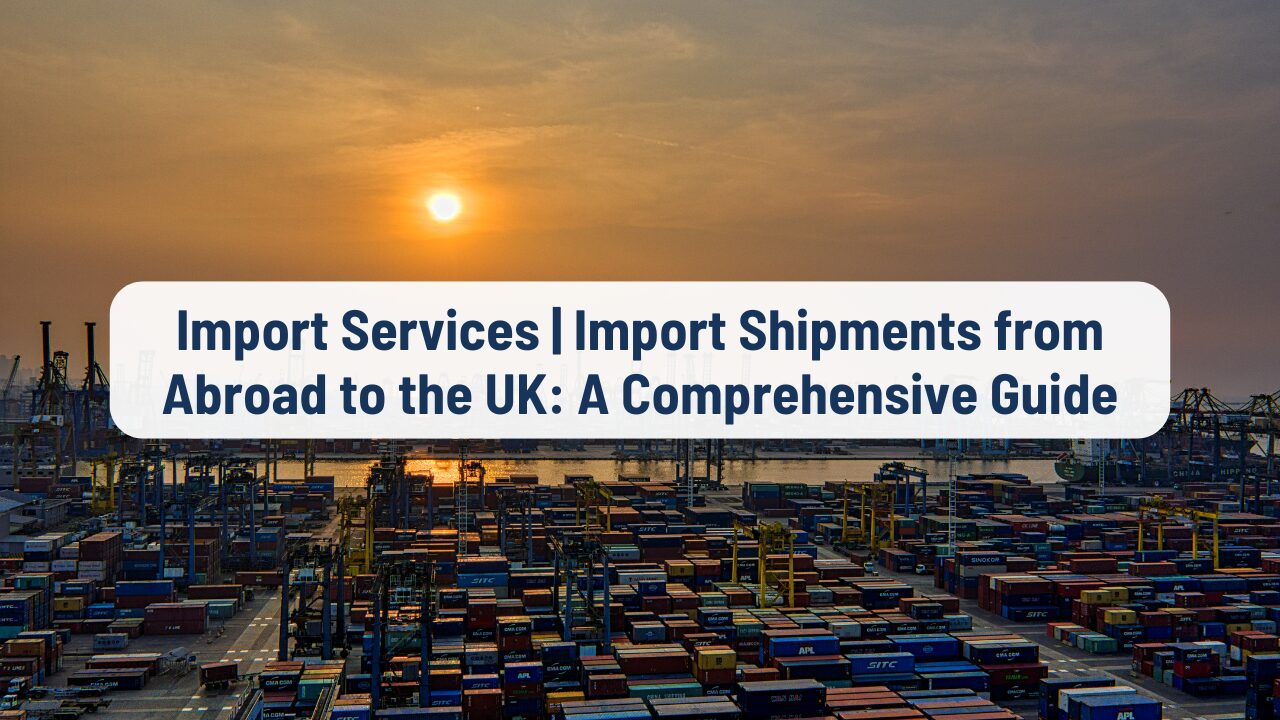
In today’s globally interconnected marketplace, reliable import services are essential for businesses and consumers alike. With international trade evolving rapidly, navigating the complexities of shipping goods to the UK requires expert knowledge and robust strategies. This guide explores the key aspects of importing shipments from abroad to the UK, detailing the processes, challenges, and best practices to ensure a smooth and compliant experience.
Understanding Import Services
Import services encompass a range of specialised solutions designed to facilitate the seamless delivery of goods from overseas. These services typically include:
- Freight Forwarding: Coordinating the transport of goods via sea, air, or road, and selecting the most efficient method based on product type, cost, and delivery timelines.
- Customs Clearance: Managing the intricate documentation required by HM Revenue & Customs (HMRC) and ensuring adherence to UK import regulations.
- Logistics Management: Overseeing the complete supply chain process, from origin to destination, including warehousing, handling, and last-mile delivery.
- Regulatory Compliance: Navigating import duties, taxes, and potential restrictions to prevent delays and minimise costs.
By engaging professional import services, companies gain access to expertise that can significantly mitigate risks associated with cross-border shipments and international compliance challenges.
Essential Steps in Importing Shipments to the UK
1. Selecting the Appropriate Shipping Method
The first step in successful importing is choosing the right shipping mode—be it sea freight for large, cost-effective shipments, air freight for expedited delivery, or specialised courier services for smaller consignments. Evaluating factors such as urgency, budget, and product type helps determine the optimal approach.
2. Preparing Accurate Documentation
Every successful import operation hinges on accurate and comprehensive documentation. Essential documents include:
- Commercial Invoice: Outlining the value and details of the goods.
- Packing List: Listing itemised contents and packaging specifications.
- Bill of Lading or Air Waybill: Acting as the contract of carriage between the shipper and the carrier.
- Certificates of Origin and Compliance: Verifying that products meet UK standards and regulations.
Ensuring that documentation is rigorously prepared minimises delays and avoids costly penalties.
3. Managing Customs Clearance and Regulatory Compliance
Navigating the UK’s customs clearance process is a critical phase in importing:
- Duties and Taxes: Understanding applicable import duties, Value Added Tax (VAT), and other tariffs specific to different goods.
- Customs Declarations: Submitting timely and accurate documentation to HMRC to facilitate smooth processing at UK borders.
- Security and Safety Protocols: Adhering to established safety and compliance standards to prevent any legal or operational setbacks.
Professional import service providers are well-versed in these requirements, ensuring that subsequent clearance occurs without unnecessary friction.
Managing Costs and Mitigating Risks
Importing goods internationally involves several cost considerations, including shipping fees, insurance, and customs duties. Here are key strategies to manage expenses and reduce risks:
- Transparent Pricing Models: Work with service providers who offer clear, upfront cost structures to avoid unexpected charges.
- Insurance Coverage: Secure comprehensive insurance to protect against potential losses or damages during transit.
- Timely Communication: Maintain open lines of communication with logistics partners to quickly address any delays or discrepancies.
- Risk Assessment: Regularly review potential risks in international shipping routes—such as geopolitical instability or regulatory changes—and adjust strategies accordingly.
This proactive approach allows businesses to anticipate potential challenges and integrate cost-effective solutions into their import strategies.
Conclusion
Efficient import services are a cornerstone for international companies and small businesses looking to bring products into the UK smoothly and compliantly. By understanding the intricacies of shipping methods, documentation, customs clearance, and risk management, organisations can transform complex global logistics into a strategic advantage.
Embrace professional import solutions to ensure that every shipment meets regulatory requirements, minimises delays, and maintains optimal cost efficiency. As international trade continues to evolve, a well-structured import service framework not only safeguards your supply chain but also enhances your competitive edge in the UK market.
Are you ready to streamline your international shipments and navigate global trade with confidence? Connect with experienced import service providers to turn legal and logistical challenges into opportunities for growth.
For Legal and Business Solution, visit: ST Consultancy
Follow Us:
Facebook – https://www.facebook.com/profile.php?id=61564973949911
Instagram – https://www.instagram.com/stconsultancy_stc/
Twitter – https://x.com/st_stc43927
LinkedIn – https://www.linkedin.com/company/st-consultancy-ltd, Dr. Erika Szita-Szegedi, Manmeet Abroll

